No Longer Living in Silence – Guest Post by Jennifer Slodysko
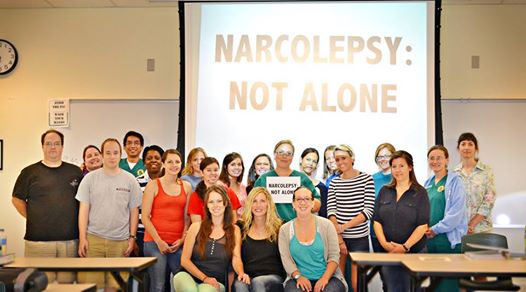 When I learned about Julie’s NARCOLEPSY: NOT ALONE campaign, I realized that I had the perfect platform to help raise awareness. As a nursing student, I thought I could do a presentation about narcolepsy to my nursing class, and to ask for volunteers to take a campaign photo. My hope was that my classmates would carry the information with them throughout their careers, and that maybe someone, somewhere would receive an earlier narcolepsy diagnosis. My classmates and I are very close, and they were a steady source of support while I was looking for my diagnosis. I was diagnosed this past May after the semester had ended, so this would also be a great opportunity to explain to everyone about narcolepsy. This idea sounded great in my mind and I became very excited about it, but then I realized how scared I actually was.
When I learned about Julie’s NARCOLEPSY: NOT ALONE campaign, I realized that I had the perfect platform to help raise awareness. As a nursing student, I thought I could do a presentation about narcolepsy to my nursing class, and to ask for volunteers to take a campaign photo. My hope was that my classmates would carry the information with them throughout their careers, and that maybe someone, somewhere would receive an earlier narcolepsy diagnosis. My classmates and I are very close, and they were a steady source of support while I was looking for my diagnosis. I was diagnosed this past May after the semester had ended, so this would also be a great opportunity to explain to everyone about narcolepsy. This idea sounded great in my mind and I became very excited about it, but then I realized how scared I actually was.
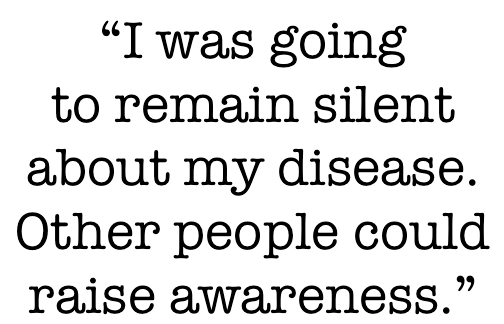 First, I would need to ask my instructor for permission to allot class time for my presentation. Up until this point I had only shared my diagnosis with people I was close with. I became fearful that by sharing my diagnosis with my instructor, she would inform me that my condition posed a risk to my performance at the hospital. What if during my final semester of nursing school, after four years of hard work, she told me that I was out of the program? I felt this was something that I could not risk, and that it would be selfish and unfair to my husband and our three children to put my new career on the line. Besides, even if I were to do the presentation, everyone would probably half listen as they noisily packed up their books while impatiently waiting for me to finish, and I’d be lucky if just a few people volunteered for the photo. That night I firmly decided that I wasn’t going to do it. I was going to remain silent about my disease. Other people could raise awareness.
First, I would need to ask my instructor for permission to allot class time for my presentation. Up until this point I had only shared my diagnosis with people I was close with. I became fearful that by sharing my diagnosis with my instructor, she would inform me that my condition posed a risk to my performance at the hospital. What if during my final semester of nursing school, after four years of hard work, she told me that I was out of the program? I felt this was something that I could not risk, and that it would be selfish and unfair to my husband and our three children to put my new career on the line. Besides, even if I were to do the presentation, everyone would probably half listen as they noisily packed up their books while impatiently waiting for me to finish, and I’d be lucky if just a few people volunteered for the photo. That night I firmly decided that I wasn’t going to do it. I was going to remain silent about my disease. Other people could raise awareness.
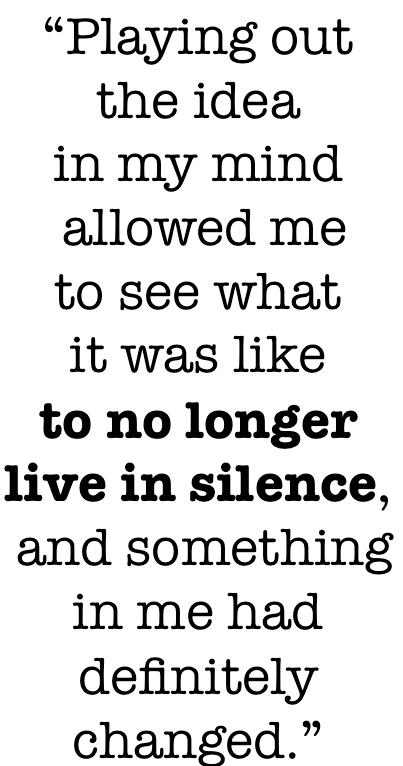 But in the morning I printed out a Narcolepsy: Not Alone sign before leaving for class. Playing out the idea in my mind allowed me to see what it was like to no longer live in silence, and something in me had definitely changed. I felt so strongly about the meaning behind this photograph: not only would it represent empowerment that people living with narcolepsy can be successful in school and other goals, but it would also exemplify awareness through education. I had the privilege to equip a group of graduating RNs with knowledge about this disease that would continue to circulate to patients and other medical professionals throughout the span of their careers. My position had changed from, ‘Let someone else do it’, to, ‘How can I not take advantage of my position to educate?’
But in the morning I printed out a Narcolepsy: Not Alone sign before leaving for class. Playing out the idea in my mind allowed me to see what it was like to no longer live in silence, and something in me had definitely changed. I felt so strongly about the meaning behind this photograph: not only would it represent empowerment that people living with narcolepsy can be successful in school and other goals, but it would also exemplify awareness through education. I had the privilege to equip a group of graduating RNs with knowledge about this disease that would continue to circulate to patients and other medical professionals throughout the span of their careers. My position had changed from, ‘Let someone else do it’, to, ‘How can I not take advantage of my position to educate?’
I visited my instructor during her office hours and explained everything – showing her the sign. To my astonishment (and extreme relief), she was completely understanding and supportive! She was very familiar with narcolepsy, so the possible misconceptions that I feared she might have were nonexistent. She thought the presentation was a great idea, and she was even my first volunteer to be in the photo! I contacted Julie to tell her about my idea, and she was very supportive. Not only did she provide resource material for me to use in my presentation, but she also cheered me on and offered guidance along the way! Knowing that she was behind me gave me an extra boost of confidence.
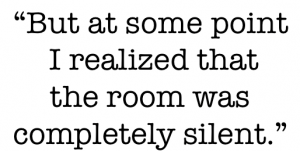
Even though I had rehearsed my presentation several times, I felt extremely nervous when I stood in front of my class two days later. What if I forgot something? What if they thought my presentation was useless? Why did I think that I qualified to raise awareness about narcolepsy? My mouth became so dry that I could barely talk, and I was trying to rush through the slides before my audience became impatient. But at some point I realized that the room was completely silent. No one was moving, or packing up books, or on the edge of their seat ready to walk out the door. Every single person was facing front and giving me their full attention, and nodding their heads in understanding. While I spoke, I received compassionate smiles and eye contact that told me, “Yes, I remember when you were struggling through that.”
The final slides in my Power Point introduced Julie Flygare, her book, and her campaign. I asked for volunteers, and explained that since the picture would be used in the campaign, I would not take it personally if anyone felt uncomfortable being photographed. However, my classmates did not hesitate! After we took the picture, I received lots of hugs and compliments on my presentation. Several people thanked me for educating them about such an underdiagnosed disease. I also spoke with a few classmates who had questions afterward. In the end, I definitely feel that I made the right decision, and I’m glad that I went forward with my idea.
Prior to having narcolepsy, I was an extremely high-functioning individual. In hindsight I can see the symptoms of narcolepsy creeping up in my twenties, however, in May 2012 at age 32 is when it started to hit hard. I knew something was wrong, but friends and doctors told me otherwise. I continued to decline that year, and by November I was barely functioning day to day. I loved my life, but no matter how hard I tried to hold onto it, it felt like sand falling through my fingers. I no longer had the ability to be me anymore. I fought hard to find a diagnosis, and I ran the gambit of diagnostic testing and consultations with numerous specialists. I quite literally had a part time job keeping up with all of my appointments. Finally, on May 20, 2013, I received my diagnosis of narcolepsy without cataplexy.
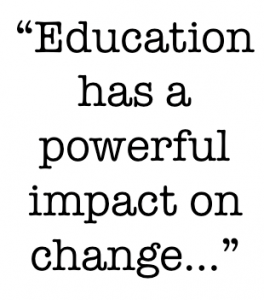 It breaks my heart to know that I am one of the “lucky ones” to be diagnosed in one year. I sincerely believe that education has a powerful impact on change, and the current delay between symptom onset and diagnosis is unacceptable. We have the capacity to change this, and Julie has made great strides toward that goal. I could never adequately express my gratitude to Julie for advocating for all of us. Without her inspiration and the avenue she’s provided to help raise awareness through her campaign, I never would have thought to do this, and I would still be living in silence. Thank you, Julie, for supporting me in raising awareness in my corner of the world. This was a life changing experience for me!
It breaks my heart to know that I am one of the “lucky ones” to be diagnosed in one year. I sincerely believe that education has a powerful impact on change, and the current delay between symptom onset and diagnosis is unacceptable. We have the capacity to change this, and Julie has made great strides toward that goal. I could never adequately express my gratitude to Julie for advocating for all of us. Without her inspiration and the avenue she’s provided to help raise awareness through her campaign, I never would have thought to do this, and I would still be living in silence. Thank you, Julie, for supporting me in raising awareness in my corner of the world. This was a life changing experience for me!
REM Runner’s Note: Thank you, Jennifer for sharing your inspiring story. You are an amazing role model to many young people with narcolepsy and by raising awareness in your nursing school, you’ve helped to create a brighter future for all those with narcolepsy. It’s an honor to be your friend and fellow advocate!
Follow the NARCOLEPSY: NOT ALONE campaign on my blog, Facebook or Twitter.
So proud of you! This was great!!!!
Thank you for this comment, Ada. I’m so proud of Jennifer too!
Wow! Inspiring! Making me think very seriously about joining as an advocate.
Thank you, Cindy. You are an advocate!
Very inspiring. Great job being so strong and forthcoming. I’m very proud of you.
Hi Melanie, Thank you for your comment. I agree, Jennifer is so inspiring!
Help I am being discriminated against in my job due to having narcolepsy and periodic limb movement disorder. I am being assessed for fitness for duty. Can anyone suggest ways to protect myself? They are trying to say I have cognitive impairment that is negatively impacting my ability to do my job as a social worker.
I am considering having an attorney represent me.
Had the perfect storm begin in September 2012 when my home was broken into. Had PTSD as a result. Unfortunately did not get any treatment for until recently. Now am having EMDR Treatment for the PTSD. Did get a home security system and they broke in before it was fully activated again in August 2013.
I have had multiple negative responses to the medications which negatively impacted my ability to do my job. I got behind in my paperwork. I had no support from management regarding and then was told I had to be assessed for “fitness for duty.” Other concerns were reported that were incorrect. When I have tried to challenge this I have not been heard. I had a recent neuropsychological evaluation done two days after the second break in and it was not positive. Am being told I may have dementia and will have to have an MRI possible PET scan, etc. I do not feel that it was appropriate to have this evaluation done two days after the original break in. I am feeling very displaced and abused by the system I work for. I am a therapist who works with all age groups. Have been in my current job for almost 14 years. I am going to be 61 years old on November 4th. Have worked as a social worker for 30 years and have never experienced this type of treatment.
I have been lied about, discriminated against, etc. I was the one who fought to be assessed for both periodic limb movement disorder and also for narcolepsy.
Any ideas on what else I can do to protect myself from injustice?
Holly Twedt
Holly, I’m so sorry to hear about your current work challenges. This sounds incredibly difficult beyond belief. I wish I had recommendations for help, but this area is way out of my league. My thoughts are with you during this challenging time.
Jennifer you go girl… 🙂
I have had a few tears again with mild Cataplexy seems to happen every time I read others stories its the emotional rush of reading all the positive things that are finally happening. I really understand that feeling of coming out. Before I kept it to myself in a way and then with Julie’s story I just thought hey what the hell we need to let people know, I too worried about it being negative on career aspects but now I find most people are really positive. Its a great feeling. It also helps with the confidence side especially with the cataplexy. I counted 20 people in your picture who now know about Narcolepsy because of you and each will talk to another so there is another 20 and on and on that’s brilliant.
And to JF I have so much gratitude for you words are hard to find.. You rock! x
“Dare to Be
When a new day begins, dare to smile gratefully.
When there is darkness, dare to be the first to shine a light.
When there is injustice, dare to be the first to condemn it.
When something seems difficult, dare to do it anyway.
When life seems to beat you down, dare to fight back.
When there seems to be no hope, dare to find some.
When you’re feeling tired, dare to keep going.
When times are tough, dare to be tougher.
When love hurts you, dare to love again.
When someone is hurting, dare to help them heal.
When another is lost, dare to help them find the way.
When a friend falls, dare to be the first to extend a hand.
When you cross paths with another, dare to make them smile.
When you feel great, dare to help someone else feel great too.
When the day has ended, dare to feel as you’ve done your best.
Dare to be the best you can –
At all times, Dare to be!”
― Steve Maraboli, Life, the Truth, and Being Free